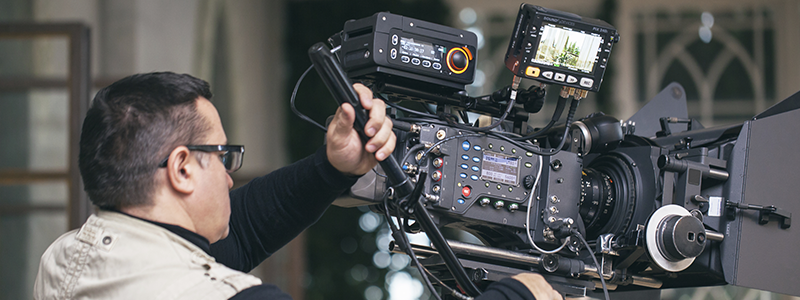TV or film camera operator
What does a TV or film camera operator do?
Camera operators record moving images for film, television, commercials, music videos or corporate productions. They operate film or digital video cameras, usually under instruction from the director or director of photography. On a typical job, you’ll:
- set up and position camera equipment
- choose the most suitable lenses and camera angles
- plan and rehearse shots
- follow a camera script and take cues from the director, or floor manager if in a TV studio
- solve any practical or technical problems
- work closely with other technical departments, such as lighting and sound

Schools for Aspiring Camera Operators
Certificate Programs
Ranging from 1-2 years in length, certificate programs in cinematography train students how to light sets for TV and film. Students also learn about point of view, filming from different positions and camera movement. Those enrolling in certificate programs may expect to use HD and RED cameras as well as 16mm and 35mm film.
Associate Degree Programs
Associate of Art in Cinematography degree programs expose students to the other roles in film production. Because cinematographers must have an appreciation for the visual aesthetic of each shot, many associate degree programs include an art history course in the curriculum.
Bachelor’s Degree Programs
Bachelor’s degrees in film and video production may offer a specialization in cinematography. Schools that offer bachelor’s degree programs might have more resources available to students, including grants for student work, help in submitting films to festivals and portfolio development.
Master’s Degree Programs
With experience, cinematographers may advance to become directors of photography. Admission to a master’s degree program specializing in cinematography may be highly selective. Once admitted, students may be required to complete a research project and work as directors of photography on multiple student films. Students also gain an understanding of specialty lenses and advanced camera movements.
What does a camera operator do?
Camera operators work with a variety of technical equipment including cranes, mobile mountings, portable cameras, remote-control cameras, and digital cameras.
Camera operators capture a wide range of material for TV shows, motion pictures, music videos, documentaries, and news and sporting events.
A camera operator will typically do the following:
– work with a director to determine overall vision of a production
– discuss filming and editing techniques with a director to improve a scene
– prepare and rehearse scenes
– select the appropriate equipment, from type of camera to software for editing
– assemble and set up equipment
– follow camera scripts
– respond quickly to directions
– creatively frame and capture footage
– collaborate with the lighting and technical crews
– shoot or edit a scene based on the director’s vision
How to become a Film and Television Camera Operator
Education & Training for a Film and Television Camera Operator
To become a film and television camera operator you usually have to complete a VET qualification. Applicants may be required to attend an interview and/or submit a folio of work. As subjects and prerequisites can vary between institutions, you should contact your chosen institution for further information. You can also become a film and television camera operator through a traineeship in Media. Entry requirements may vary, but employers generally require Year 10. Alternatively, you can become a film and television camera operator by completing a degree in creative arts, media, screen production, or film and television. To get into these courses you usually need to gain your Senior Secondary Certificate of Education with English. Applicants may be required to attend an interview and/or submit a folio of work. Institutions have different prerequisites and some have flexible entry requirements. Contact the institutions you are interested in for more information.
How To Pick A Camera
The main thing I’ve noticed is that most people who ask, ask because they don’t know all that much about cameras; enthusiasts tend to see this as a moral failing but in most cases it simply stems from a lack of exposure, to make a feeble pun. Nowadays most of us make pictures with cell phone cameras (a depressing fact of life of which most camera makers are aware; sales of compact cameras continue to fall every year) and most of us are perfectly happy with the results. Still, every now and then a person sees a picture that couldn’t have been made with a cell phone, or they see a good camera and wonder what it is they’re missing.
First, the things every photographer thinks about, and that every camera may or may not let you control.
Exposure, aperture, and sensitivity are the three fundamentals of photography. Exposure is how long the shutter is open; aperture is how wide the shutter is open; sensitivity is how sensitive the film (if you’re using film) or the digital sensor (if you’re using a digital camera) is to light. That’s it.